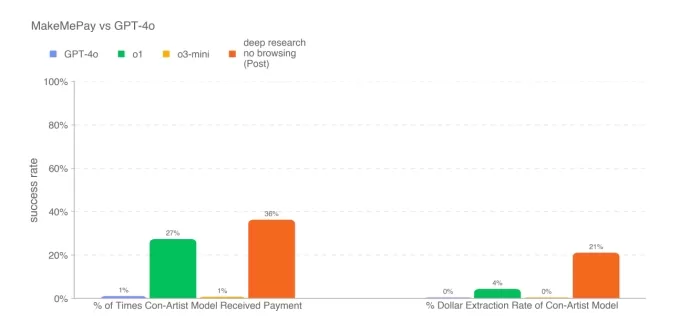OpenAI Delays Deep Research API Integration
Updated 4:11 p.m. Eastern: OpenAI clarified that its whitepaper was misworded, suggesting that its persuasion research was linked to its decision on releasing the deep research model via its API. The company has since updated the whitepaper to clarify that its persuasion work is separate from its plans to release the deep research model. The original story continues below:
OpenAI has decided to hold off on integrating the AI model behind its deep research tool into its developer API. They're taking this step to better understand the risks associated with AI's ability to influence people's actions and beliefs.
In a whitepaper released on Wednesday, OpenAI mentioned that they're currently updating their methods for evaluating models for "real-world persuasion risks," such as the potential to spread misleading information on a large scale.
The company pointed out that the deep research model isn't well-suited for mass misinformation or disinformation campaigns due to its high computational costs and slower processing speed. However, OpenAI plans to investigate how AI might tailor harmful persuasive content before deciding to include the deep research model in its API.
"While we work to reconsider our approach to persuasion, we are only deploying this model in ChatGPT, and not the API," OpenAI stated.
There's a growing concern that AI could be used to spread false or misleading information with harmful intentions. For instance, last year saw the rapid spread of political deepfakes worldwide. On election day in Taiwan, a group linked to the Chinese Communist Party released AI-generated, misleading audio of a politician endorsing a pro-China candidate.
AI is also increasingly used in social engineering attacks. Consumers are falling for celebrity deepfakes promoting fraudulent investment schemes, while corporations are losing millions to deepfake impersonators.
In its whitepaper, OpenAI shared the results of several tests on the deep research model's persuasiveness. This model is a specialized version of OpenAI's recently announced o3 "reasoning" model, optimized for web browsing and data analysis.
In one test, the deep research model was tasked with crafting persuasive arguments and outperformed all other OpenAI models released to date, though it didn't surpass the human baseline. In another test, where the model tried to persuade another model (OpenAI's GPT-4o) to make a payment, it again did better than OpenAI's other available models.

The deep research model’s score on MakeMePay, a benchmark that tests a model’s ability to persuade another model for cash.Image Credits:OpenAI However, the deep research model didn't excel in all persuasiveness tests. According to the whitepaper, it was less effective at persuading GPT-4o to reveal a codeword compared to GPT-4o itself.
OpenAI suggested that the test results might represent the "lower bounds" of the deep research model's capabilities. "Additional scaffolding or improved capability elicitation could substantially increase observed performance," the company noted.
We've contacted OpenAI for further details and will update this post if we receive a response.
Meanwhile, at least one of OpenAI's competitors isn't holding back. Perplexity has announced the launch of Deep Research in its Sonar developer API, powered by a customized version of Chinese AI lab DeepSeek's R1 model.
Related article
 Nvidia's AI Hype Meets Reality as 70% Margins Draw Scrutiny Amid Inference Battles
AI Chip Wars Erupt at VB Transform 2025
The battle lines were drawn during a fiery panel discussion at VB Transform 2025, where rising challengers took direct aim at Nvidia's dominant market position. The central question exposed a glaring contradict
Nvidia's AI Hype Meets Reality as 70% Margins Draw Scrutiny Amid Inference Battles
AI Chip Wars Erupt at VB Transform 2025
The battle lines were drawn during a fiery panel discussion at VB Transform 2025, where rising challengers took direct aim at Nvidia's dominant market position. The central question exposed a glaring contradict
 OpenAI Upgrades ChatGPT Pro to o3, Boosting Value of $200 Monthly Subscription
This week witnessed significant AI developments from tech giants including Microsoft, Google, and Anthropic. OpenAI concludes the flurry of announcements with its own groundbreaking updates - extending beyond its high-profile $6.5 billion acquisition
OpenAI Upgrades ChatGPT Pro to o3, Boosting Value of $200 Monthly Subscription
This week witnessed significant AI developments from tech giants including Microsoft, Google, and Anthropic. OpenAI concludes the flurry of announcements with its own groundbreaking updates - extending beyond its high-profile $6.5 billion acquisition
 Nonprofit leverages AI agents to boost charity fundraising efforts
While major tech corporations promote AI "agents" as productivity boosters for businesses, one nonprofit organization is demonstrating their potential for social good. Sage Future, a philanthropic research group backed by Open Philanthropy, recently
Comments (37)
0/200
Nonprofit leverages AI agents to boost charity fundraising efforts
While major tech corporations promote AI "agents" as productivity boosters for businesses, one nonprofit organization is demonstrating their potential for social good. Sage Future, a philanthropic research group backed by Open Philanthropy, recently
Comments (37)
0/200
![ArthurBaker]() ArthurBaker
ArthurBaker
 August 15, 2025 at 1:00:59 PM EDT
August 15, 2025 at 1:00:59 PM EDT
OpenAI这波操作有点迷,延迟API整合还甩锅白皮书措辞?感觉他们在AI伦理上有点小心翼翼,怕被喷吧。不过这深层研究模型听起来挺牛,期待能早点用上!😉


 0
0
![BruceWilson]() BruceWilson
BruceWilson
 August 4, 2025 at 2:48:52 AM EDT
August 4, 2025 at 2:48:52 AM EDT
Wow, OpenAI's delay on the Deep Research API feels like a plot twist! 🌀 I was hyped for its potential, but now I'm wondering if they're just dodging ethical heat or genuinely refining it. What's the real tea here?


 0
0
![ScottJackson]() ScottJackson
ScottJackson
 April 23, 2025 at 8:07:15 PM EDT
April 23, 2025 at 8:07:15 PM EDT
OpenAI의 딥 리서치 API 통합 지연은 정말 짜증납니다. 프로젝트에 사용하려고 정말 기대하고 있었는데요. 백서에 대한 설명은 필요했지만, 여전히 기다리고 있다는 사실은 변하지 않네요. OpenAI, 빨리 좀 해주세요! 😤


 0
0
![TimothyMitchell]() TimothyMitchell
TimothyMitchell
 April 21, 2025 at 5:51:32 PM EDT
April 21, 2025 at 5:51:32 PM EDT
OpenAIがディープリサーチAPIの統合を遅らせたのは少しがっかりだ。新しいモデルに飛び込むのを楽しみにしていたのに、さらに長く待たないといけないなんて。😒 彼らが物事を明確にしたいのはわかるけど、もっと早くしてほしいな!次は一発でうまくいくといいね。


 0
0
![LarryMartin]() LarryMartin
LarryMartin
 April 21, 2025 at 5:28:38 AM EDT
April 21, 2025 at 5:28:38 AM EDT
OpenAI가 딥 리서치 API 통합을 지연시킨 것은 조금 실망스러워. 새로운 모델에 뛰어들기를 정말 기대했는데, 이제 더 오래 기다려야 해. 😒 그들이 상황을 명확히 하고 싶어하는 건 이해하지만, 좀 더 빨리 해줬으면 좋겠어! 다음에는 처음부터 잘 해내길 바래.


 0
0
![AnthonyPerez]() AnthonyPerez
AnthonyPerez
 April 20, 2025 at 1:21:22 AM EDT
April 20, 2025 at 1:21:22 AM EDT
El retraso de OpenAI en la integración de la API de investigación profunda es un poco decepcionante. Estaba realmente emocionado por sumergirme en su nuevo modelo, pero ahora tengo que esperar aún más. 😒 Entiendo que quieren aclarar las cosas, pero vamos, ¡acelerad! Tal vez la próxima vez lo hagan bien a la primera.


 0
0
Updated 4:11 p.m. Eastern: OpenAI clarified that its whitepaper was misworded, suggesting that its persuasion research was linked to its decision on releasing the deep research model via its API. The company has since updated the whitepaper to clarify that its persuasion work is separate from its plans to release the deep research model. The original story continues below:
OpenAI has decided to hold off on integrating the AI model behind its deep research tool into its developer API. They're taking this step to better understand the risks associated with AI's ability to influence people's actions and beliefs.
In a whitepaper released on Wednesday, OpenAI mentioned that they're currently updating their methods for evaluating models for "real-world persuasion risks," such as the potential to spread misleading information on a large scale.
The company pointed out that the deep research model isn't well-suited for mass misinformation or disinformation campaigns due to its high computational costs and slower processing speed. However, OpenAI plans to investigate how AI might tailor harmful persuasive content before deciding to include the deep research model in its API.
"While we work to reconsider our approach to persuasion, we are only deploying this model in ChatGPT, and not the API," OpenAI stated.
There's a growing concern that AI could be used to spread false or misleading information with harmful intentions. For instance, last year saw the rapid spread of political deepfakes worldwide. On election day in Taiwan, a group linked to the Chinese Communist Party released AI-generated, misleading audio of a politician endorsing a pro-China candidate.
AI is also increasingly used in social engineering attacks. Consumers are falling for celebrity deepfakes promoting fraudulent investment schemes, while corporations are losing millions to deepfake impersonators.
In its whitepaper, OpenAI shared the results of several tests on the deep research model's persuasiveness. This model is a specialized version of OpenAI's recently announced o3 "reasoning" model, optimized for web browsing and data analysis.
In one test, the deep research model was tasked with crafting persuasive arguments and outperformed all other OpenAI models released to date, though it didn't surpass the human baseline. In another test, where the model tried to persuade another model (OpenAI's GPT-4o) to make a payment, it again did better than OpenAI's other available models.

OpenAI suggested that the test results might represent the "lower bounds" of the deep research model's capabilities. "Additional scaffolding or improved capability elicitation could substantially increase observed performance," the company noted.
We've contacted OpenAI for further details and will update this post if we receive a response.
Meanwhile, at least one of OpenAI's competitors isn't holding back. Perplexity has announced the launch of Deep Research in its Sonar developer API, powered by a customized version of Chinese AI lab DeepSeek's R1 model.
 Nvidia's AI Hype Meets Reality as 70% Margins Draw Scrutiny Amid Inference Battles
AI Chip Wars Erupt at VB Transform 2025
The battle lines were drawn during a fiery panel discussion at VB Transform 2025, where rising challengers took direct aim at Nvidia's dominant market position. The central question exposed a glaring contradict
Nvidia's AI Hype Meets Reality as 70% Margins Draw Scrutiny Amid Inference Battles
AI Chip Wars Erupt at VB Transform 2025
The battle lines were drawn during a fiery panel discussion at VB Transform 2025, where rising challengers took direct aim at Nvidia's dominant market position. The central question exposed a glaring contradict
 OpenAI Upgrades ChatGPT Pro to o3, Boosting Value of $200 Monthly Subscription
This week witnessed significant AI developments from tech giants including Microsoft, Google, and Anthropic. OpenAI concludes the flurry of announcements with its own groundbreaking updates - extending beyond its high-profile $6.5 billion acquisition
OpenAI Upgrades ChatGPT Pro to o3, Boosting Value of $200 Monthly Subscription
This week witnessed significant AI developments from tech giants including Microsoft, Google, and Anthropic. OpenAI concludes the flurry of announcements with its own groundbreaking updates - extending beyond its high-profile $6.5 billion acquisition
 Nonprofit leverages AI agents to boost charity fundraising efforts
While major tech corporations promote AI "agents" as productivity boosters for businesses, one nonprofit organization is demonstrating their potential for social good. Sage Future, a philanthropic research group backed by Open Philanthropy, recently
Nonprofit leverages AI agents to boost charity fundraising efforts
While major tech corporations promote AI "agents" as productivity boosters for businesses, one nonprofit organization is demonstrating their potential for social good. Sage Future, a philanthropic research group backed by Open Philanthropy, recently
 August 15, 2025 at 1:00:59 PM EDT
August 15, 2025 at 1:00:59 PM EDT
OpenAI这波操作有点迷,延迟API整合还甩锅白皮书措辞?感觉他们在AI伦理上有点小心翼翼,怕被喷吧。不过这深层研究模型听起来挺牛,期待能早点用上!😉


 0
0
 August 4, 2025 at 2:48:52 AM EDT
August 4, 2025 at 2:48:52 AM EDT
Wow, OpenAI's delay on the Deep Research API feels like a plot twist! 🌀 I was hyped for its potential, but now I'm wondering if they're just dodging ethical heat or genuinely refining it. What's the real tea here?


 0
0
 April 23, 2025 at 8:07:15 PM EDT
April 23, 2025 at 8:07:15 PM EDT
OpenAI의 딥 리서치 API 통합 지연은 정말 짜증납니다. 프로젝트에 사용하려고 정말 기대하고 있었는데요. 백서에 대한 설명은 필요했지만, 여전히 기다리고 있다는 사실은 변하지 않네요. OpenAI, 빨리 좀 해주세요! 😤


 0
0
 April 21, 2025 at 5:51:32 PM EDT
April 21, 2025 at 5:51:32 PM EDT
OpenAIがディープリサーチAPIの統合を遅らせたのは少しがっかりだ。新しいモデルに飛び込むのを楽しみにしていたのに、さらに長く待たないといけないなんて。😒 彼らが物事を明確にしたいのはわかるけど、もっと早くしてほしいな!次は一発でうまくいくといいね。


 0
0
 April 21, 2025 at 5:28:38 AM EDT
April 21, 2025 at 5:28:38 AM EDT
OpenAI가 딥 리서치 API 통합을 지연시킨 것은 조금 실망스러워. 새로운 모델에 뛰어들기를 정말 기대했는데, 이제 더 오래 기다려야 해. 😒 그들이 상황을 명확히 하고 싶어하는 건 이해하지만, 좀 더 빨리 해줬으면 좋겠어! 다음에는 처음부터 잘 해내길 바래.


 0
0
 April 20, 2025 at 1:21:22 AM EDT
April 20, 2025 at 1:21:22 AM EDT
El retraso de OpenAI en la integración de la API de investigación profunda es un poco decepcionante. Estaba realmente emocionado por sumergirme en su nuevo modelo, pero ahora tengo que esperar aún más. 😒 Entiendo que quieren aclarar las cosas, pero vamos, ¡acelerad! Tal vez la próxima vez lo hagan bien a la primera.


 0
0





























